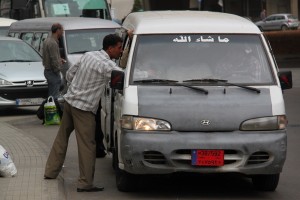While France fights tooth and nail to maintain its state-run monopolies, begrudgingly shuffling into line with EU directives on free markets with a decade’s delay, the Lebanese, where possible, take matters into their own hands when it comes to creating healthy competition. The transport system, if it can be called such, is a prime example. The small number of buses run by the main operator are kept on the ball by a bigger number of vehicles run by any old chap who buys a minivan and sticks a number on his windscreen and runs the same routes – but more frequently – for the same flat fee, 1,000 LL per trip whatever the distance. So the locals have created private public transport. That is to say, you still get the crowded grubby experience, but it actually works. The minibus drivers crawl the curbs with the door open, honking and slowing just enough to lip-read the destinations called out by potential passengers, who then either jump aboard or else disappear in a cloud of exhaust fumes as the driver deems their journey incompatible with his route.
There is one difference between the LCC-operated buses and their mimics: on the former you pay up front in exchange for a chit, while on the latter you pay as you get off. The ticket system always made me laugh for its pseudo officialness until the bus I was in got pulled over by the police. The passengers jumped off and, brandishing their tickets at the next red bus which passed, were able to continue their journey at no extra charge. Small private competitors offer no such guarantee, so it makes sense to pay once you have arrived at your destination, as police, traffic patrols, army, shoddy mechanics, local grocers and the eternal jams contrive to make this impossible.
The coupling of state-run and independent services is a recurrent theme in Lebanon, where, as a friend rightly pointed out, there are two of everything. There are two electricities – the mains operated by Kahraba Lubnan, which is out for several hours a day, and the local generator supplier who provides power during the cuts to those who can afford it. Lebanon runs on two currencies, goods are paid for in a mix of dollars and Lebanese pounds. There are the taxis and then there are the shared taxi-services. There are the rates for those who already know the price, and the rates for those who don’t; some tourist sights even have a stated dual pricing system on the wall, one rate for locals, another for foreigners. There are two armies – the national forces and Hizbollah’s better equipped militia. There are two water supplies – the municipal supply and the private companies which fill the tanks on the roof when that fails. Even within the mains, there are two taps, one for the fresh running water (only at night) and one for stored water. There are two de facto governments, two extreme social classes and 18 state-recognised religious communities.
In this DIY nation, this kaleidoscope of dichotomies, nothing really works, but everything is possible.

love it, and so true ! lebanese people never relied on the government for anything, In no other country I am aware of people buy there own generators for electricity and sell their neighbors. The other day i was in lebanon i was in one of those minibuses that happened to hit a pedestrian and decided to run away, but the lebanese public decided to take the matter into their own hands they chased the bus for like 5 minutes before the bus decided to give up and stop.